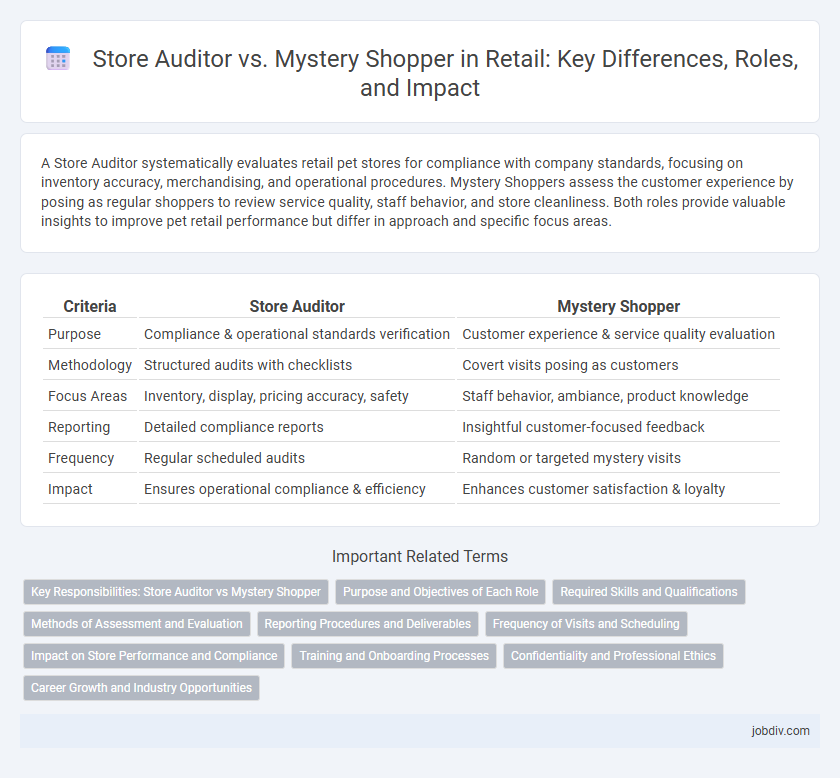A Store Auditor systematically evaluates retail pet stores for compliance with company standards, focusing on inventory accuracy, merchandising, and operational procedures. Mystery Shoppers assess the customer experience by posing as regular shoppers to review service quality, staff behavior, and store cleanliness. Both roles provide valuable insights to improve pet retail performance but differ in approach and specific focus areas.
Table of Comparison
| Criteria | Store Auditor | Mystery Shopper |
|---|---|---|
| Purpose | Compliance & operational standards verification | Customer experience & service quality evaluation |
| Methodology | Structured audits with checklists | Covert visits posing as customers |
| Focus Areas | Inventory, display, pricing accuracy, safety | Staff behavior, ambiance, product knowledge |
| Reporting | Detailed compliance reports | Insightful customer-focused feedback |
| Frequency | Regular scheduled audits | Random or targeted mystery visits |
| Impact | Ensures operational compliance & efficiency | Enhances customer satisfaction & loyalty |
Key Responsibilities: Store Auditor vs Mystery Shopper
Store Auditors conduct comprehensive evaluations of retail operations, focusing on compliance with company policies, inventory accuracy, pricing integrity, and store appearance through detailed checklists and reports. Mystery Shoppers assess the customer experience by performing covert visits to evaluate employee behavior, service quality, and overall shopper satisfaction without revealing their identity. Both roles provide critical insights, but Store Auditors emphasize operational standards while Mystery Shoppers focus on frontline service effectiveness.
Purpose and Objectives of Each Role
Store Auditors systematically evaluate retail operations to ensure compliance with company standards, focusing on inventory accuracy, merchandising consistency, and adherence to store policies. Mystery Shoppers provide insights on customer experience by anonymously assessing service quality, staff behavior, and store ambiance to identify areas for improvement. Both roles aim to enhance retail performance, but Store Auditors emphasize operational accuracy while Mystery Shoppers prioritize customer satisfaction and service excellence.
Required Skills and Qualifications
Store auditors require strong analytical skills, attention to detail, and proficiency in data collection and reporting tools to evaluate retail operations and compliance effectively. Mystery shoppers need keen observation abilities, excellent communication skills, and discretion to accurately assess customer service and store environments without detection. Both roles demand reliability, objectivity, and a solid understanding of retail standards to ensure unbiased and actionable insights.
Methods of Assessment and Evaluation
Store auditors use structured checklists and standardized scoring systems to evaluate compliance with brand standards, focusing on measurable data such as stock levels, merchandising accuracy, and store cleanliness. Mystery shoppers assess customer experience through covert visits, providing qualitative feedback on service quality, employee behavior, and store ambiance based on real-time interactions. Both methods are essential for comprehensive retail performance analysis, combining objective metrics with subjective consumer perspectives.
Reporting Procedures and Deliverables
Store auditors generate comprehensive reports based on standardized checklists that capture compliance, inventory accuracy, and operational efficiency, providing actionable insights for management. Mystery shoppers deliver detailed, narrative-style evaluations emphasizing customer experience, employee behavior, and store ambiance, often including qualitative feedback and scorecards. Both roles employ distinct reporting procedures tailored to their specific audit objectives, ensuring precise and relevant deliverables for retail performance improvement.
Frequency of Visits and Scheduling
Store auditors conduct scheduled, regular visits based on predetermined audit calendars, ensuring consistent and systematic data collection for compliance and performance metrics. Mystery shoppers perform unscheduled, spontaneous visits to simulate real customer experiences, providing authentic insights into store operations and staff behavior. The combination of fixed auditing schedules and random mystery shopping visits enhances comprehensive retail evaluation.
Impact on Store Performance and Compliance
Store Auditors provide structured evaluations based on standardized checklists, ensuring strict compliance with company policies and operational standards, which directly supports consistent store performance metrics. Mystery Shoppers offer unfiltered, real-time customer experience insights that reveal service quality and operational gaps, influencing improvements in customer satisfaction and employee behavior. Both roles complement each other by addressing compliance and customer-centric areas, driving holistic enhancements in retail store performance.
Training and Onboarding Processes
Store auditors undergo comprehensive training focused on audit standards, compliance protocols, and analytical reporting to ensure consistent evaluation of store operations. Mystery shoppers receive targeted onboarding emphasizing customer experience assessment, scenario simulation, and detailed observation techniques to capture authentic retail interactions. Both roles require continuous skill development but differ in their training depth and focus areas to align with their specific audit versus experiential feedback objectives.
Confidentiality and Professional Ethics
Store auditors maintain strict confidentiality by adhering to formal corporate protocols and ethical standards, ensuring sensitive business information remains protected. Mystery shoppers, while also valuing discretion, operate with less formal oversight but emphasize ethical behavior to provide unbiased feedback without revealing their identity. Both roles require a strong commitment to professionalism and confidentiality to uphold the integrity of retail evaluations.
Career Growth and Industry Opportunities
Store auditors typically have structured career paths within retail corporations, advancing toward roles in compliance, operations management, or quality assurance by leveraging their expertise in financial auditing and store performance analysis. Mystery shoppers gain versatile industry exposure across various retail brands, enhancing skills in customer experience evaluation and market research, which can lead to opportunities in marketing, brand management, or consulting. Both roles offer distinct growth trajectories; store auditors benefit from formal certifications and in-house promotions, while mystery shoppers build flexible portfolios with broad sector knowledge applicable to diverse retail or consumer service careers.
Store Auditor vs Mystery Shopper Infographic

 jobdiv.com
jobdiv.com